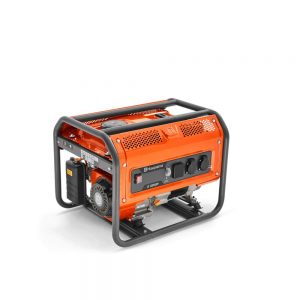Generators: The future of your home and business?
Whether you’re halfway across the world or sitting at home in South Africa, a generator is a must for your home as well as your business. In times of darkness generators come to the rescue, but they can be a bit confusing and a bit daunting for a first-time user. That is why we have created a quick and easy guide with everything you need to know before purchasing and using generators, in just 6 minutes reading time.
What are generators?
Generators are essentially devices or appliances that convert any type of energy (mechanical, chemical etc.) into electrical energy that can power other things. Electric generators can be used to convert fuel into electrical energy. This fuel will usually be petrol, propane or diesel.
Smaller engine generators usually use petrol, whereas larger generators use diesel, propane gas or liquid propane. What makes generators so appealing is that they save the day during blackouts and are pretty easy to use and maintain. Their appeal comes from the fact that when there is a blackout of electrical power in your home or your office, generators can be used to power things, ranging from cellphone charges all the way to entire buildings, depending on the engine size and capacity of course.

What can generators be used for?
Stores that rent or sell generators usually see a significant spike when there are storm warnings and people are worried about power outages, or when an area is experiencing intermittent power outages that are scheduled. America calls this “blackouts”, but South African’s knew of this long before and coined the term “load shedding”.
Load shedding is when a country’s power supply is running low or is at risk, and then the municipality or those in charge of power supply, in South Africa’s case it would be Eskom, decide to essentially ease the load a bit by cutting power. They will switch of the electricity in certain areas for a specific period of time, usually 2-4 hours at a time, and will then move across the power grid alternating which areas have power and which don’t. While this may seem a bit barbaric, and truthfully it can be, it does assist in shedding the load and in saving valuable power resources such as coal.
If you have lived in South Africa and experienced load shedding, then you’re well aware of planning your days around Eskom’s load shedding schedule. Unfortunately, these outages can cause major disruptions across the board and can bring businesses to a halt. When power is off for an extended period of time, it has a knock-on effect and stores that sell fresh produce could potentially lose significant cashflow due to food going bad.
If you own a small business then you could also be impacted by this, as cash registers, card machines and Wi-Fi will all be down. It can interrupt matric students writing their final exams, or even large aquariums which require electrical pumps. Arguably the most important thing to consider is hospitals.

Hospitals have a variety of electrical equipment that is all being used simultaneously to save the lives of people. It could quite literally be life-threatening if hospitals were to experience power outages. That is why most hospitals have industrial generators that power the entire hospital in the event of a power failure.
As it’s becoming increasingly clear that power outages, or load-shedding, will never come to a complete halt, more and more homes as well as businesses are looking into the option of generators. Generators will help keep businesses operational, keep hospitals functioning, and keep households warm and powered.
Types of generators:
It’s clear that generators lean more towards being a necessity than a luxury item, but there are different types of generators and they offer varying features and functions. There are three primary different types of generators, standby, inverter, and portable (arguably the most popular of the three).
Standby Generators:
Standby generators have an electrical system and function using an automatic transfer switch. This means that in the event of a power outage, the generator will automatically (within a few seconds) turn on and starting powering whatever is connected to it, without anyone having to physically go to the machine and turn it on. This type is great for hospitals, airports, elevators, grocery stores etc. A few characteristics and features or standby generators include:
– Will turn on automatically to operate (efficient)
– Can use either natural gas or liquid propane
– Delivers permanent power protection
– Makes use of an internal combustion engine
– Constantly self-monitors utility power
Portable Generators:
Portable generators, like the name suggests, are portable and can therefore be transported to different locations and can be used in various places around the house or building. A portable generator is usually powered by petrol or diesel and is used to temporarily provide electrical power, so not automatically. A few characteristics of portable generators include:
– Has sockets that you can plug extension cords into or electrical appliances
– Can be wired to a building’s subpanels
– Makes use of a combustion engine to conduct electricity
– Can be used in remote sites
– Engine should run at 3600 rpm to render the standard 60 hz of current
– Uses a governor to control and monitor the speed of the engine
– Can be used to power tools, lights, televisions, freezers and refrigerators
Inverter generator:
An inverter generator’s engine is connected to an alternator to produce alternating current (AC) power. Unlike other generators, an inverter one uses a rectifier to convert the alternating current power into a direct current power. A few characteristics of an inverter generators include:
– Makes use of an advanced electronic circuit
– Makes use of and relies on high-tech magnets
– Outputs alternating current, converts this to direct current, and then inverts this to AC
– Goes through three different phases to produce electricity
– Is able to maintain a constant and continuous flow of current to appliances that are connected to the generator
– Is considerably more energy efficient than some other generators as the engine speed is able to adjust itself according to how much power is actually required for connected devices or appliances
– The alternating current can be set to any frequency and voltage if one used the proper equipment
– Is relatively small in size and lightweight, and can therefore be transported in the boot of a car which is efficient

Which suits you?
If you are needing to power refrigerators or tools such as nail guns and spray gun systems, then portable generators are the best bet for you. If you are looking to power things such as a laptop or a car battery, then you might consider getting an inverter generator. If you are operating emergency systems such as hospital machinery or equipment, then standby generators are the best and safest option.
Parts of a generator:
• Fuel system
• Cooling and exhaust system
• Lubrication system
• Engine
• Alternator
• Voltage regulator
• Battery Charger
• Control panel
• Main assembly (frame)
Maintenance for generators:
A generator is a necessity for most businesses and is really useful to have for everyday homes. They do, however, require slight maintenance to make sure that the generator performs optimally and has a long lifespan in your home or business. Maintenance across the three major engine types is fairly similar, but it is urged that you follow the provided maintenance schedule of the manufacturer.
Routine maintenance of a generator consists of primarily a general inspection. Inspections should consist of checking the machine for leaks, checking the oil as well as coolant levels, checking over the hoses and belts, and checking the battery cables and terminals. It is important that you regularly inspect the oil and change it frequently.
How often you should change the oil depends on how often you use the generator, the environment in which it’s in, and the manufacturer. Although, it is usually recommended that you change the oil after 100 hours of use, this is especially important if your generator uses diesel. Below are a few general generator maintenance tips:
– The cooling system need to be maintained by regularly checking the coolant levels at existing intervals, which should be done when the machine is shutdown.
– Diesel fuel degrades quickly as water and microbes can contaminate the fuel which will lead to clogged filters and fuel line. Fuel should therefore be cleaned and filtered annually using biocides. Do NOT use biocides to clean standby generators however, as this will attract moisture.
– Especially in a standby generator, it is important to regularly check the battery power because battery issues are one of the primary complaints when it comes to this type of generator. To check the battery power, ensure that the batteries are charged enough to last for an extended period of time so that there are no start-up delays.
– The battery should be regularly tested to indicate the battery’s current status. One does this by checking the electrolyte levels and specific gravity of the batteries. It is also essential to ensure that the batteries are physically clean from any debris or leakage.
– It is recommended that you ‘exercise’ the generator on a weekly basis, by letting it run for 30 minutes. This will help remove any excess moisture, charge the battery, filter the oil and fuel, as well as lubricate the engine.
– It is advised that you keep all records of inspections and testing as this will help you stay up to date with maintenance but will also act as a fail-safe if your generator breaks and is under warranty.
To rent or buy, that is the question:
You may be wondering if it is truly worth going out and purchasing a generator, and the answer is entirely a case-by-case scenario. If you are hosting an event, such as a wedding or catering a dinner, then you may want to rent out a generator to ensure that you are covered to operate in the event of a power failure. However, if you will be planning to use the generator on multiple occasions, then it may be worth investing in purchasing a generator which in essence could save you money in the long run if you consider the loss of business without any alternate power.
If you are running a business and require electricity of any kind, then it is truly essential that you have a generator available to you at all times. When renting, this may not always be possible due to limited rent-out availability. If you do choose to rent out, then you will usually have to pay an insurance premium as well and will have to abide to a list of regulations and specific company policies, whereas if you invest in your own personal generator you can use it as you wish and will never have to scramble for last minute power.





